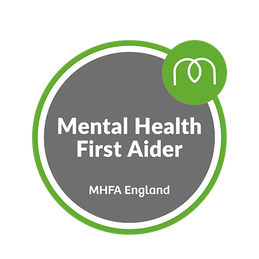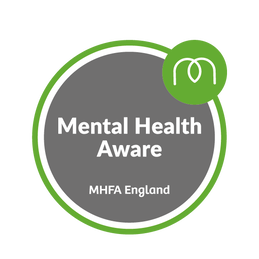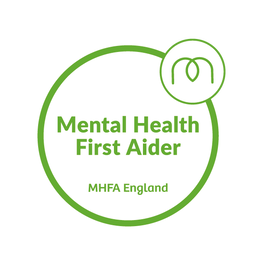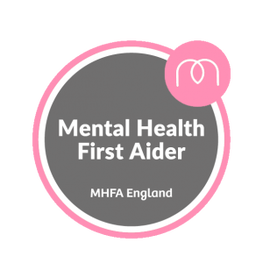Would you know how to help?
We all have mental health, just as we all have physical health. Mental ill health can strike at any time and can affect people from all walks of life.
Although things are improving, stigma still exists around mental ill health. As a society, we don't tend to know how to take care of our mental health like we do our physical health. This means that people may not know how to support a friend, family member or colleague experiencing a mental health issue, or where to go for support with their own mental health.
Become a Mental Health First Aider
Mental Health First Aid (MHFA) is a training course which teaches people how to identify, understand and help someone who may be experiencing a mental health issue.
MHFA won’t teach you to be a therapist, but it will teach you to listen, reassure and respond, even in a crisis – and even potentially stop a crisis from happening.
You’ll learn to recognise warning signs of mental ill health, and develop the skills and confidence to approach and support someone while keeping yourself safe.
You’ll also learn how to empower someone to access the support they might need for recovery or successful management of symptoms. This could include self-help books or websites, accessing therapy services through their GP, their school or place of work, online self-referral, support groups, and more.
What’s more, you’ll gain an understanding of how to support positive wellbeing and tackle stigma in the world around you.
We all have mental health, just as we all have physical health. Mental ill health can strike at any time and can affect people from all walks of life.
Although things are improving, stigma still exists around mental ill health. As a society, we don't tend to know how to take care of our mental health like we do our physical health. This means that people may not know how to support a friend, family member or colleague experiencing a mental health issue, or where to go for support with their own mental health.
Become a Mental Health First Aider
Mental Health First Aid (MHFA) is a training course which teaches people how to identify, understand and help someone who may be experiencing a mental health issue.
MHFA won’t teach you to be a therapist, but it will teach you to listen, reassure and respond, even in a crisis – and even potentially stop a crisis from happening.
You’ll learn to recognise warning signs of mental ill health, and develop the skills and confidence to approach and support someone while keeping yourself safe.
You’ll also learn how to empower someone to access the support they might need for recovery or successful management of symptoms. This could include self-help books or websites, accessing therapy services through their GP, their school or place of work, online self-referral, support groups, and more.
What’s more, you’ll gain an understanding of how to support positive wellbeing and tackle stigma in the world around you.
What we do
Mental Health First Aid (Youth) - Online
4 x 2 hour sessions
Self-learning activities between sessions
Qualify as a Youth Mental Health First Aider.
Self-learning activities between sessions
Qualify as a Youth Mental Health First Aider.
Frequently Asked Questions
What is the role of a Mental Health First Aider?
The role of the Mental Health First Aider is to support employees in the workplace who are experiencing mental ill health or distress. This support can vary from having a non-judgmental conversation with a colleague, through to guiding them towards the right support.
The Mental Health First Aider role includes:
The Mental Health First Aider role includes:
- Being able to recognise the early signs and symptoms of common workplace mental health illnesses
- Having the necessary skills to have a supportive, non-judgmental conversation with those who need it
- Possessing the knowledge and confidence to guide colleagues to the appropriate professional support if they require it
- Promoting greater awareness of mental health in the workplace and reducing stigma.
What is the impact of mental illness in the workplace?
Approximately 1 in 4 people in the UK will experience a mental illness each year. In 2016, 15.8 million UK work days were lost due to mental illness.*
The largest causes of sickness absence for our county’s workforce is depression, stress, and anxiety. Mental illness costs UK businesses around £35 billion every year, this equates to £10.6 billion lost to sickness absence, £21.2 billion in reduced productivity, and £3.1 billion in substituting staff members who vacate their roles due to mental illness.
The largest causes of sickness absence for our county’s workforce is depression, stress, and anxiety. Mental illness costs UK businesses around £35 billion every year, this equates to £10.6 billion lost to sickness absence, £21.2 billion in reduced productivity, and £3.1 billion in substituting staff members who vacate their roles due to mental illness.
How effective are the Mental Health First Aid courses?
Independent research and evaluation shows that taking part in a Mental Health First Aid course raises awareness of mental illnesses, encourages early intervention to aid recovery, increases confidence in dealing with mental illnesses and reduces stigma.
Research suggests that improving UK workplace mental health management could reduce employers’ losses attributed to mental illness by 30%, collectively saving £8 billion a year.
Research suggests that improving UK workplace mental health management could reduce employers’ losses attributed to mental illness by 30%, collectively saving £8 billion a year.
Why does an employer’s duty of care include staff mental health?
Employers have a legal duty of care to ensure that employees are provided with a safe working environment and must take reasonable care to prevent personal injury (including mental or physical harm) that may arise in the workplace.
What are the business consequences of ignoring mental health in the workplace?
Someone with poor mental health may not realise it and even if they do, they may be reluctant to seek help, or might not know where to turn for care. In the workplace, there is still a great deal of ignorance around mental health issues, including uncertainty about how to recognise mental illness, and uncertainty about how to react when faced with it. This means that those in need of mental health help and support do not receive it.
When left uninformed, managers and co-workers may unwittingly exhibit stigmatising behaviours, which can be detrimental to a person experiencing a mental health issue. Furthermore, by failing to respond appropriately to an employee with a mental health issue, an organisation may open itself to a claim for compensation. This could be lengthy, expensive, and take precious time away from managers and staff.
When left uninformed, managers and co-workers may unwittingly exhibit stigmatising behaviours, which can be detrimental to a person experiencing a mental health issue. Furthermore, by failing to respond appropriately to an employee with a mental health issue, an organisation may open itself to a claim for compensation. This could be lengthy, expensive, and take precious time away from managers and staff.
WHAT ARE THE BENEFITS OF TRAINING EMPLOYEES TO HOLD MENTAL HEALTH FIRST AID CERTIFICATION
Independent research and evaluation shows that taking part in a Mental Health First Aid course:
By becoming more informed and aware, managers and employees will be able to more easily spot the signs and symptoms of mental health issues and provide the right support.
- raises awareness of mental illnesses,
- encourages early intervention to aid recovery,
- increases confidence in dealing with mental illnesses
- reduces stigma around mental health issues.
By becoming more informed and aware, managers and employees will be able to more easily spot the signs and symptoms of mental health issues and provide the right support.
Health and Safety Executive (HSE) guidance for employers
The HSE have updated their guidance. As of 2018, employers need to consider covering Mental Health First Aid training in addition to First Aid at Work training.
The HSE have updated their guidance. As of 2018, employers need to consider covering Mental Health First Aid training in addition to First Aid at Work training.
What action should EMPLOYER take?
Organisations should consider:
Your workplace may want to:
- ensuring that their health and safety risk assessments consider not just physical health and risks, but also mental health and risks
- managing and mitigating the risks of harm in the workplace and having ways to support people with mental health issues
- treating mental health in a similar way to physical health. For example, by having as many first aiders for mental health as for physical health.
Your workplace may want to:
- have qualified Mental Health First Aiders. This includes adequate mental health first aid cover for periods of absence or multiple workplace sites.
- consider the recommendations (‘Core Standards’) of the Thriving at Work: Stevenson/Farmer review
- encourage all employees to maintain a healthy workplace through mental health awareness training or resources
- ensure that HR policies and practices recognise the needs of those with mental health conditions. Read our advice on conducting a Mental Health Risk Assessment and creating a workplace wellbeing policy
- have a clear and well – communicated mental health wellbeing policy. Our research suggests 80% of employees weren’t sure if their company had a mental health wellbeing policy. An organisation may open itself to a claim for compensation by failing to respond appropriately to an employee with a mental health issue.
What hasn’t changed?
The new guidance doesn’t replace any existing guidance for employers on first aid at work. Provision of care within the workplace is not intended to replace professional mental health care or therapy. The Mental Health First Aid courses do not enable an individual to act as a mental health professional such as a therapist or psychiatrist.
There is existing guidance and regulations around stress in the workplace, in addition to this latest guidance. For example, HSE guidance for stress in the workplace state that employees have a legal duty to protect employees from stress at work by doing a risk assessment and acting on it. This can also reduce the incidence and negative impact of mental ill health.
There is existing guidance and regulations around stress in the workplace, in addition to this latest guidance. For example, HSE guidance for stress in the workplace state that employees have a legal duty to protect employees from stress at work by doing a risk assessment and acting on it. This can also reduce the incidence and negative impact of mental ill health.
Is having Mental Health First Aiders a legal requirement?
Having Mental Health First Aiders in the workplace is a recommendation, not legislation, so there is no set date when workplaces must have sufficient mental health provision.
Employers need to treat mental health in a similar way to physical health. Employers are encouraged to take steps to consider employees’ mental health to provide a safe working environment. Workplaces could undertake a needs assessment and put in place strategies to address any risks and needs highlighted.
Employers need to treat mental health in a similar way to physical health. Employers are encouraged to take steps to consider employees’ mental health to provide a safe working environment. Workplaces could undertake a needs assessment and put in place strategies to address any risks and needs highlighted.
How many Mental Health First Aiders do I need?
We recommend that employers should try to have as many first aiders for mental health as first aiders for physical health.







